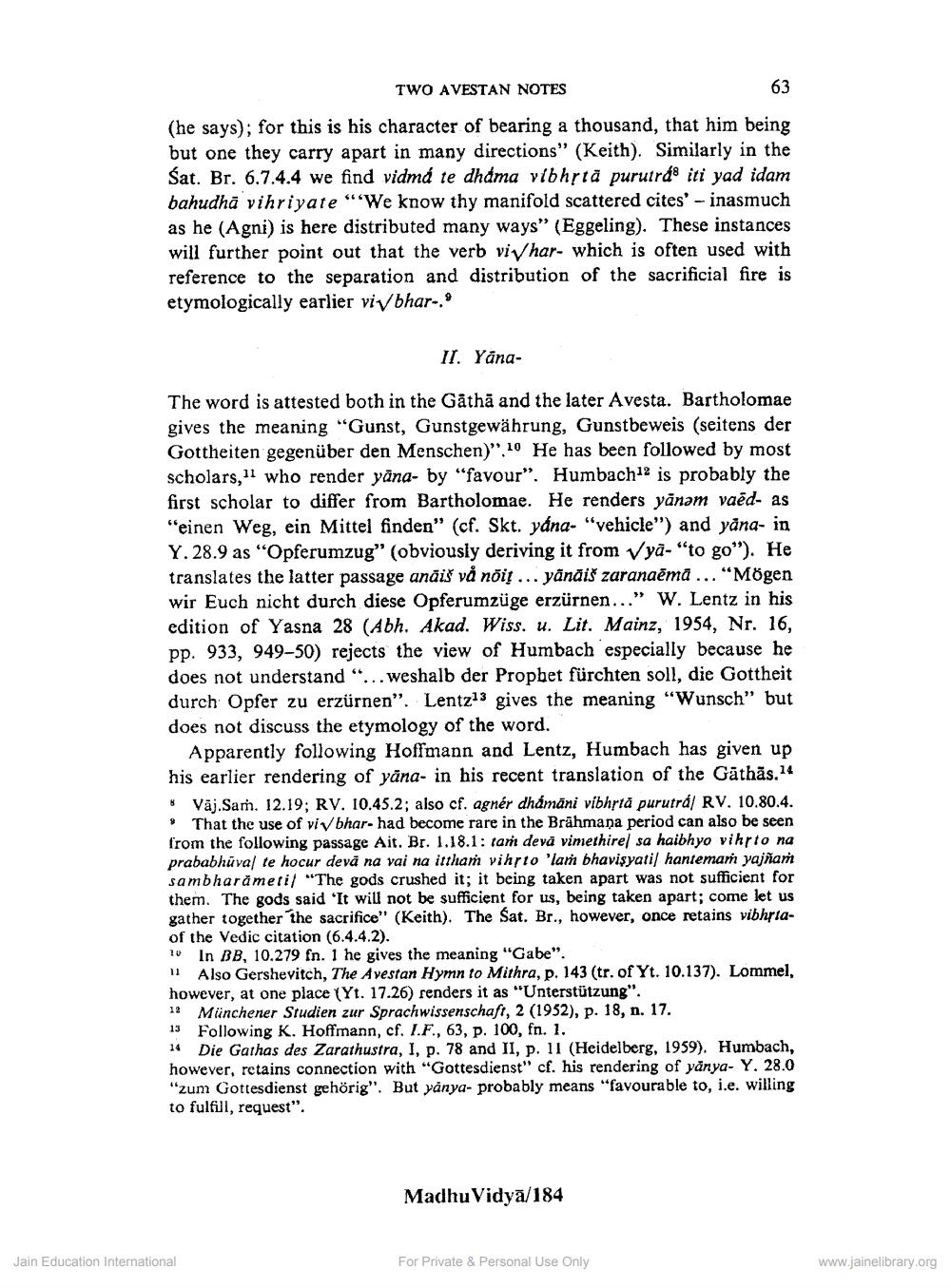________________
63
TWO AVESTAN NOTES
(he says); for this is his character of bearing a thousand, that him being but one they carry apart in many directions" (Keith). Similarly in the Śat. Br. 6.7.4.4 we find vidmá te dhdma vibhṛta purutráR iti yad idam bahudhä vihriyate "We know thy manifold scattered cites" - inasmuch as he (Agni) is here distributed many ways" (Eggeling). These instances. will further point out that the verb vihar- which is often used with reference to the separation and distribution of the sacrificial fire is etymologically earlier vi bhar-,
II. Yana
11
The word is attested both in the Gatha and the later Avesta. Bartholomae gives the meaning "Gunst, Gunstgewährung, Gunstbeweis (seitens der Gottheiten gegenüber den Menschen)". He has been followed by most scholars, who render yana- by "favour". Humbach is probably the first scholar to differ from Bartholomae. He renders yānam vaēd- as "einen Weg, ein Mittel finden" (cf. Skt. ydna- "vehicle") and yana- in Y. 28.9 as "Opferumzug" (obviously deriving it from vya- "to go"). He translates the latter passage andis và nõit... yānāiš zaranaēmā... "Mögen wir Euch nicht durch diese Opferumzüge erzürnen..." W. Lentz in his edition of Yasna 28 (Abh. Akad. Wiss. u. Lit. Mainz, 1954, Nr. 16, pp. 933, 949-50) rejects the view of Humbach especially because he does not understand "... weshalb der Prophet fürchten soll, die Gottheit durch Opfer zu erzürnen". Lentz gives the meaning "Wunsch" but does not discuss the etymology of the word.
Apparently following Hoffmann and Lentz, Humbach has given up his earlier rendering of yana- in his recent translation of the Gathas.14
Vāj.Sam. 12.19; RV. 10.45.2; also cf. agnér dhámäni vibhrtă purutrá/ RV. 10.80.4. "That the use of viv/bhar- had become rare in the Brahmana period can also be seen from the following passage Ait. Br. 1.18.1: tam deva vimethirel sa haibhyo vihrto na prababhuval te hocur deva na vai na ittham vihṛto 'lam bhavisyatil hantemam yajñam sambharameti/ "The gods crushed it; it being taken apart was not sufficient for them. The gods said 'It will not be sufficient for us, being taken apart; come let us gather together the sacrifice" (Keith). The Sat. Br., however, once retains vibhriaof the Vedic citation (6.4.4.2).
10 In BB, 10.279 fn. 1 he gives the meaning "Gabe".
11 Also Gershevitch, The Avestan Hymn to Mithra, p. 143 (tr. of Yt. 10.137). Lommel, however, at one place (Yt. 17.26) renders it as "Unterstützung".
Münchener Studien zur Sprachwissenschaft, 2 (1952), p. 18, n. 17.
12
13 Following K. Hoffmann, cf. I.F., 63, p. 100, fn. 1.
14 Die Gathas des Zarathustra, I, p. 78 and II, p. 11 (Heidelberg, 1959). Humbach, however, retains connection with "Gottesdienst" cf. his rendering of yanya- Y. 28.0 "zum Gottesdienst gehörig". But yanya- probably means "favourable to, i.e. willing to fulfill, request".
Jain Education International
Madhu Vidya/184
For Private & Personal Use Only
www.jainelibrary.org




